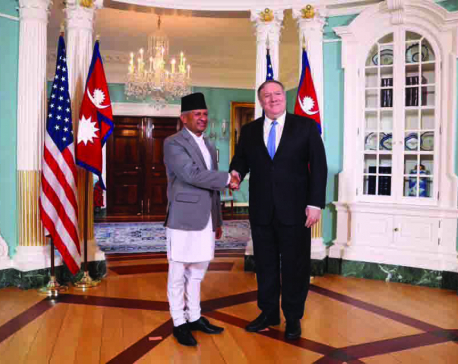
OR
Why should the US pay its dues to the UN?
Published On: May 2, 2021 07:00 AM NPT By: Dr Surendra Singh Rawal

Without any doubt, the tumultuous four years of the Trump presidency significantly damaged the US multilateral outlook and its relation to the UN. However, the US has not burnt its bridge completely.
On April 13, China paid its assessed contribution to the UN regular budget for 2021, and its deputy permanent representative to the UN, Dai Bing, during a meeting of the Fifth Committee, urged that UN member states "in particular those with the capacity to pay, to pay their assessed contributions in full, on time, and without conditions," implying that the US should pay its UN dues. While the US has been the top contributor to the UN since its establishment, it has been withholding a portion of its contribution from time to time. In 1994, Congress set a permanent cap of 25% on US peacekeeping assessment, arguing that it was too high for America.
All the 193 member states of the United Nations have to contribute to run the global body based on the 'scales of assessment,' which is a formula derived through a complex process that factors in the country's share of global gross national income (GNI) and other adjustments such as population and debt burden. The Administrative and Budgetary Committee of the UN General Assembly, known as the Fifth Committee, decides on the assessment scale every third year.
The scale deriving process is not just complex, but the divergent interests of its large member states make it difficult to modify. Consequently, very few changes have been made so far. A case in point is India, which, despite being one of the world's largest and fastest-growing economies, now contributes a quarter of its contribution in 1950. However, India is also the most extensive cumulative police and troop contributor to the UN, which is factored in the scale.
As the world's number one economy, the US is the largest contributor to the UN. According to the formula, the US contribution to regular and peacekeeping budgets is 22% and 28%, respectively. Despite the humongous share, the actual US assessed contribution to the UN amounts to just 0.2% of the overall annual federal budget. Similarly, the entire UN peacekeeping budget represents less than 0.5% of all yearly global military expenditure and around 1% of the US defense budget.
Surprisingly, the US has been frequently behind on its dues once the US Congress started withholding part of its contribution in the 1980s. And, since Fiscal Year 2017, the US has accrued about $ 920 million in peacekeeping arrears to date. The US arrears seriously impede UN peacekeeping missions worldwide by delaying reimbursements to the UN troop-contributing countries mainly from Asia and Africa. It also interrupts UN missions' logistics and supply chain and hinders their ability to deliver peace and security on the ground.
While negatively impacting UN programs and peacekeeping efforts, the US's failure to pay in time also jeopardizes its own national interests by compromising its ability to advance the American agenda at the UN. As one of the permanent members of the UN Security Council, the US plays a vital role in authorizing, shaping, and overseeing UN missions. Not paying its dues full and timely has not just a detrimental impact on UN operations, but the US runs the risk of global criticism and the possibility of losing voting rights in the General Assembly.
Though a considerable number of people in the US establishment think that there is no profitable return of investment of the US contribution to the UN, most Americans consistently believe that the benefit outweighs the cost. A bipartisan poll in 2017 finds that seven in 10 Americans want the US to pay its share. For them, the UN still acts as a force multiplier for attaining the US foreign policy goals.
Americans who view the UN as a strategic toolkit to advance their country's interests have plausible reasons to do so. Because the US is outsourcing its burden of international security and humanitarian assistance to the troops contributing countries through the UN at a fraction of cost and without expending much American blood and treasure. As of February 2021, out of over 81,000 blue helmets in 13 current missions to maintain stability in various parts of the world, the US provides only 31 peacekeepers. The US Government Accountability Office found that the UN peacekeeping missions are almost eight times cheaper than the US boots on the ground, making the UN financing a bargain for American taxpayers.
Peacekeeping, the poster child of the UN system, has been a crucial conflict management tool. Among others, the UN missions have supported disarmament, election monitoring, political transition in various parts of the globe, thereby reducing violence and providing some sort of protection of civilians.
The US's continuous engagement with the UN helps advance not only American security interests but also economic and value interests and other foreign policy goals. The UN works on various issues such as human rights, counter-terrorism, nonproliferation, and development to bring stability in different parts of the world, obviating US direct involvement. When emergencies strike due to conflicts, natural disasters, or famines, leaving millions homeless, the UN agencies are the ones in the forefront that provide food, shelter, and other human needs.
Moreover, not paying all the US assessed contribution in time is likely to compromise American leadership at the UN. On the flip side, the US payment of its due in time exerts moral pressure on other member states to follow suit. And, equally, it demonstrates the US’s commitment to multilateralism.
Now the second-largest contributor to UN regular budget and peacekeeping assessments, China, after paying its dues a couple of weeks ago, asserted that it had "always actively supported the work of the UN, firmly safeguarded the international system and upheld multilateralism with concrete actions." China further argued that it had been voicing against "unilateralism, protectionism and bullying practice" at the global body.
Obviously, two great powers, China and Russia, are challenging the US leadership position at the UN. Both the countries have been vocal about their firm commitment to multilateralism and the UN, whereas the US commitment wavered at times. Rising China is looking for a more assertive role in all three major areas of the UN function -- international peace and security, human rights and humanitarian actions, and sustainable development -- not just the development part as in the past. It means the US needs even more commitment and engagement at the UN not only from the US national interests' perspective but also to create a ‘balance of power' in what is essentially known as the collective security mechanism. American failure to play a leading role at the UN obliges China to fill the vacuum.
Without any doubt, the tumultuous four years of the Trump presidency significantly damaged the US multilateral outlook and its relation to the UN. However, the US has not burnt its bridge completely. Thus, it is imperative for the US to recover from the diminished reputation and start leading the global body as quickly as possible. As a starting point, the Biden administration should support Secretary-General Antonio Guterres' efforts of organizational reform, including his 'Action for Peacekeeping' initiative. The right way of showcasing the US comeback will be paying all of its dues in time.
You May Like This

Drifts on foreign policy
Diplomacy and development have been conducted in an ad hoc manner based more on sporadic “big dream talks” than a... Read More...

Oct 3: 6 things to know by 6 PM today
Your daily dose of missed important news of the day. ... Read More...







Just In
- NRB to provide collateral-free loans to foreign employment seekers
- NEB to publish Grade 12 results next week
- Body handover begins; Relatives remain dissatisfied with insurance, compensation amount
- NC defers its plan to join Koshi govt
- NRB to review microfinance loan interest rate
- 134 dead in floods and landslides since onset of monsoon this year
- Mahakali Irrigation Project sees only 22 percent physical progress in 18 years
- Singapore now holds world's most powerful passport; Nepal stays at 98th












Leave A Comment